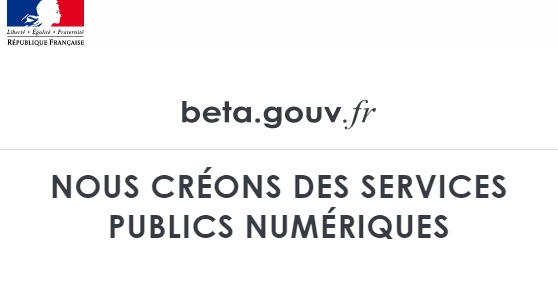Since June 2013, the State has been experimenting with a new way of building digital public services. As a result, a dozen state startups have emerged, 12 more are in the construction phase and 12 more are in the investigation phase.
A Digital Services Incubator has been set up within the DINSIC, the French government's interministerial directorate for digital and information and communication systems, to support these projects.
State startups set out to target an identified, circumscribed problem, the resolution of which seems realistic. "For the Mes aides project, the question was quite simple: as a user, what aid am I entitled to? It is not a question of redoing the entire system of social aid applications, but just of meeting a specific need of the user.
Entirely focused on continuous experimentation, these state startups do not follow the canons of traditional projects. They cannot be guided by overly rigid specifications or formal terms of reference. They also have a short time frame. "None of the startups built their project alone, in a vacuum. Each time, they have experimented with it by confronting it with the reality of users and administrations... The priority of these startups is to stick to the uses, and never to deviate from them over time... In fact, this feedback from the field has most of the time materialized through open labs, i.e. collaborative workshops regularly bringing together the stakeholders in the product under construction.
Tightly knit, autonomous, multidisciplinary teams, working within a short time frame
In concrete terms, a State start-up is a team of 2 to 4 people, financed by an administration to create an innovative digital service, with the main goal of satisfying the user. " The team is tight, autonomous, multidisciplinary, and entirely dedicated to the project: one or two developers as well as a product manager who makes this project a personal affair, and that nothing should make him deviate from his path. The product manager's mission is to make the necessary contacts for the project in the departments involved and to ensure their support.Supporting administrations, encouraging the platform state
At first at the service of the citizen to remove certain administrative irritants, the state startups are also, at the same time, in support of the teams of the ministries. "We hope that the latter will eventually be able to take charge of the projects and bring them to life. To do this, we will transfer the code and the teams that developed it to them. This technological control of the solution, which translates here into an internalization of developments, is fundamental. State startups borrow the codes of open source, agility, lean startup and design-driven development.A state-owned startup is not a startup
"The need for radical innovation requires that a State Startup be initiated far from any constraint, so that it does not reproduce the explicit or implicit rules that underlie the service as it exists today. However, it does not need private capital. A State Startup is therefore simply a team of 2 to 4 people financed by an administration and totally autonomous to find its market.This iconoclastic posture leads to profound changes. It requires relying on voluntary users who will create conviction around the first observed benefits. Corollary: a State Startup does not seek a general consensus before starting, it seeks a first satisfied user.
Currently:
- 12 startups are in investigation mode
- 12 in construction mode
- 11 in consolidation mode
- and a startup in pass mode





